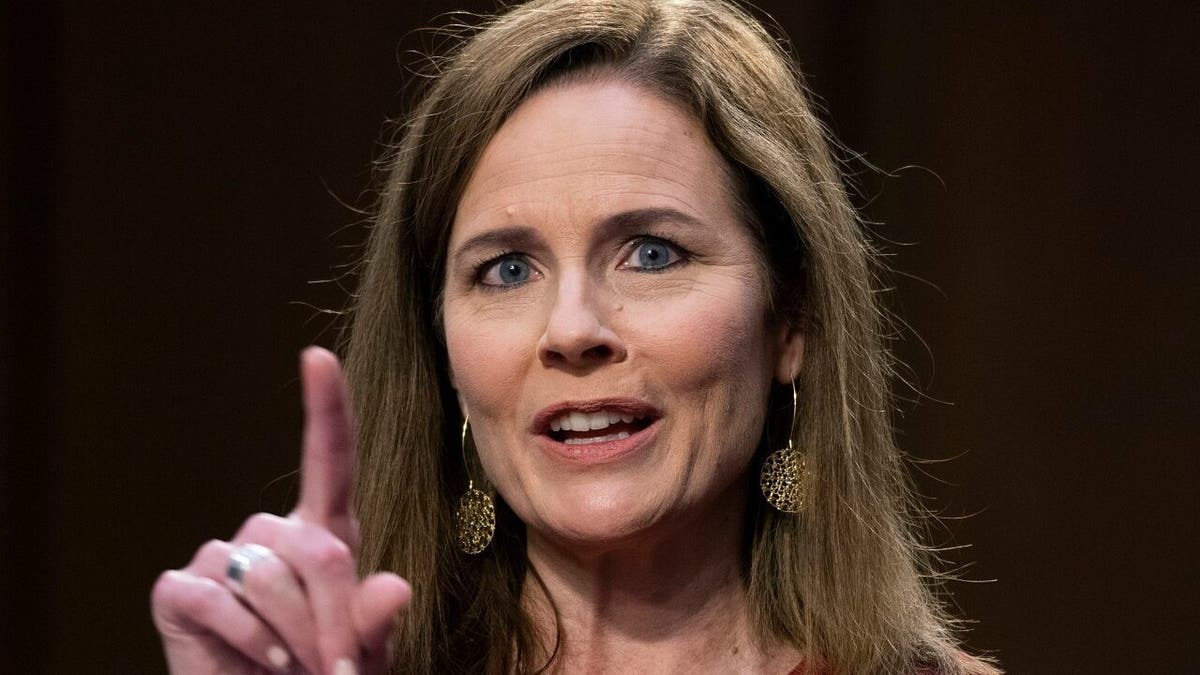Amy Coney Barrett answers Sen. Feinstein on abortion and Supreme Court: 'I'll follow the law'
Sen. Dianne Feinstein, D-Calif., presses Judge Amy Coney Barrett on her stance on Roe v Wade in Senate confirmation hearing.
Supreme Court nominee Amy Coney Barrett cited the woman she could be replacing on the high court on Tuesday, when Senate Judiciary Committee Democrats pressed her for her opinion on hot-button issues.
In one exchange, Barrett invoked the "Ginsburg Rule" when Senate Judiciary Committee ranking member Dianne Feinstein, D-Calif., asked during Barrett's confirmation hearing if she agrees with the late Justice Antonin Scalia's view that the Constitution does not guarantee a right to gay marriage.
BARRETT ADMITS TO OWNING A GUN, SAYS SHE CAN SET ASIDE BELIEFS TO RULE ON 2ND AMENDMENT FAIRLY
"I'm not going to express a view on whether I agree or disagree with Justice Scalia for the same reasons that I've been giving," Barrett said. "Justice Ginsburg with her characteristic pithiness used this to describe how a nominee should comport herself at a hearing: no hints, no previews, no forecasts. That has been the practice of nominees before her, but everybody calls it the 'Ginsburg Rule' because she stated it so concisely and it’s been the practice of every nominee since."
Barrett also reminded Feinstein of what she told Sen. Lindsey Graham, R-S.C., earlier in the day about how she and Scalia are two different people despite having a shared philosophy.
“I don’t think that anybody should assume that just because Justice Scalia decided a decision a certain way that I would too,” she said.

Supreme Court nominee Amy Coney Barrett speaks during her confirmation hearing before the Senate Judiciary Committee on Capitol Hill in Washington, Tuesday, Oct. 13, 2020. (Tom Williams/Pool via AP)
At another point in the hearing, Barrett also referenced Ginsburg when Feinstein asked if she agreed with Scalia's view that Roe v. Wade was decided incorrectly.
"Senator, I completely understand why you are asking the question, but again, I can't pre-commit or say, 'Yes, I'm going in with some agenda,' because I'm not," she said.
Meanwhile, Feinstein asked Barrett to be forthright about her views on abortion and Roe v. Wade and tried to drill down on Barrett's stances on a number of issues.
"I do want to be forthright and answer every question so far as I can," Barrett said, citing Justice Elena Kagan's confirmation hearing. "She said that she was not going to grade precedent or give it a thumbs up or thumbs down."
"It would actually be wrong and in violation of the cannons for me to do that as a sitting judge," Barrett added.
Feinstein shot back: "On something that is really a major cause with major effect on half of the population of this country, it's distressing not to get a straight answer."
Barrett responded that she understood the question, but could not "pre-commit" to a certain view on Roe v. Wade or its progeny Planned Parenthood v. Casey.
As Feinstein continued to ask Barrett if she agreed with certain statements on precedent, Barrett continued to refuse to give answers committing to a certain outcome of a case.
Barrett did add that she would follow the principles of "stare decisis," which is the concept that the court will defer to past decisions in most cases, depending on a complex confluence of factors.
Sen. Patrick Leahy, D-Vt., brought up Democrats calls for Barrett to recuse herself specifically from any election-related cases. "He's counting on you to deliver him the election," Leahy said, noting comments by the president.
CLICK HERE TO GET THE FOX NEWS APP
Barrett said that she would not be able to make any commitment on recusing herself until a case came before her, citing Ginsburg's past description of when a justice should recuse herself.
Barrett also avoided making commitments when Feinstein asked her to weigh in on California v. Texas, the Supreme Court case set to be argued on Nov. 10 that could overturn the ACA. Barrett refused to talk about the case except to say it had to do with the concept of "severability." When a court decides a part of a law is unconstitutional and must be overturned, it then decides whether the rest of the law can stand without that part, or if the entire law must fall because the unconstitutional part was too central to its purposes.
Fox News' Tyler Olson contributed to this report.













































